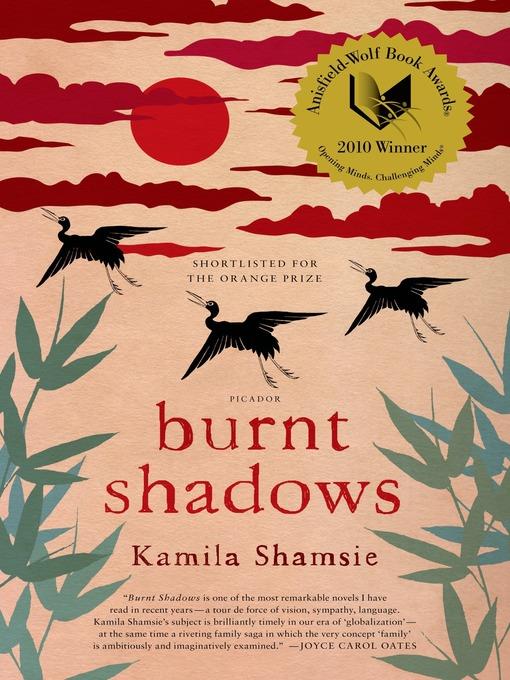
Burnt Shadows
A Novel
کتاب های مرتبط
- اطلاعات
- نقد و بررسی
- دیدگاه کاربران
نقد و بررسی

Starred review from January 26, 2009
Shamsie takes readers on a tour de force in this examination of the impact of war, following a trajectory from the devastation of Nagasaki in WWII through the conflict-ridden formation of Pakistan in the late 1940s to post-9/11 Manhattan and war-torn Afghanistan. Konrad Weiss, living in Nagasaki in the summer of 1945, hires a local woman, Hiroko Tanaka, to help him write a book about the city. The romance that blossoms is cut short when the atom bomb falls, killing Konrad, and after a while, Hiroko, feeling she can no longer stay in her country, travels to India to find Konrad’s sister, Ilse, the wife of a British lawyer enjoying the privileges of the British raj’s final days. From there, Shamsie brilliantly interweaves the lives of an array of characters as she brings the story forward to the 1980s, then to the beginning of the 21st century, exploring the clashes between loyalty to family, homeland and cause. Shamsie’s unsparing look at how individuals respond when war affects their world makes for an intriguing, heartrending tale of human connection.

March 15, 2009
An epic tale of two families whose lives are intertwined by conflict.
As a young woman, Hiroko Tanaka survives the bombing of Nagasaki, which takes the life of her first love, German-born Konrad Weiss. Physically and mentally scarred, Hiroko flees to Konrad's sister Elizabeth, who lives with her English husband James Burton in Delhi. Sajjad Ashraf, who frequents the Burton household, gives Urdu lessons to Hiroko, and they fall in love. But arranged marriages are traditional in his Muslim family, so the couple elopes and flees to Istanbul. Later, after Partition ends Sajjad's hopes of returning to Delhi, they move to Karachi. There Hiroko bears a son, Raza, who grows into a precocious youth with a passion for languages. With the appearance at their door of James and Elizabeth's son Harry, the lines of the two families cross once more. Raza flubs a final exam and deviates from his college-bound path to befriend a young Afghani smuggler, with whom he attempts to join the mujahideen. Shamsie (Broken Verses, 2005, etc.) builds vivid contemporary scenes on a rich and sometimes sordid history; the modern characters' struggles attain tragic, even mythic resonance as parents' ordeals are visited on their children. Wit, formidable imagination and intricate, well-worked characterizations distinguish the twisty narrative. Raza experiences mixed emotions as he travels through the blasted hinterlands with Afghani arms smugglers. In a world fraught with duplicity and inside deals among militant tribesmen, military contractors and CIA operatives, he learns that morality is anything but straightforward. But the struggles of zealots and mercenaries are dwarfed by Hiroko's titanic journey. Having survived and suffered so much, she finds herself sitting with a crossword puzzle in a West Village bistro, contemplating the grand and hellish pattern of her loved ones' lives as she considers with horror the threat of nuclear proliferation between India and Pakistan.
With a rare combination of skill and sensitivity, Shamsie generates pathos for outsiders and the displaced.
(COPYRIGHT (2009) KIRKUS REVIEWS/NIELSEN BUSINESS MEDIA, INC. ALL RIGHTS RESERVED.)

February 15, 2009
An engrossing story of resilience and humanity in the face of crushing tragedy, Shamsie's ("Salt and Saffron") fifth novel follows the interconnected lives of two families brought together in Nagasaki near the end of World War II. Their fates are linked for 60 years through several countries and ultimately to a somewhat paranoid New York following 9/11. The allusion to recent historical events is not simply an overt device on which to hang a particular political viewpoint; these events are integral to the personal narratives presented here. Shamsie explores the meanings of cultural identity through characters who endure sacrifice, betrayal, and human-made disaster as they live and work in countries foreign to them. This critically acclaimed Pakistani author, who writes in English, is a powerful storyteller who deserves a wider U.S. audience. Readers who appreciate the cross-cultural scope and insight into global tensions in the works of Khaled Hosseini and Salman Rushdie will thoroughly enjoy this novel. Highly recommended.Gwen Vredevoogd, Marymount Univ., Arlington, VA
Copyright 2009 Library Journal, LLC Used with permission.

April 15, 2009
Shamsies complexfifth novel, spanning the years between August 1945 and September 2001, is a story of twoinextricably connected and politically impacted families. Berliner Konrad Weiss and Hiroko Tanaka, his translator, meet in Nagasaki and plan to marry. But after he is incinerated by the bomb and she is left permanently scarred, Hiroko journeys to Delhi, home of Konrads half-sister, Elizabeth Burton, and her British husband, James. Hiroko bonds with James assistant, Sajjad. With Partition between India and Pakistan looming, the Burtons return to England, where their son Henry is in boarding school. Hiroko and Sajjad marry, buttheyre not allowed back into India, since Sajjad is a Muslim who chose to leave. Shamsie takes up their story 35 years later in Karachi, where they have one son, Raza, afterbomb-related miscarriages. Henry appears, searching for his past, and offers to assist with Razas education; by 2001, theyre working together for the CIA in the U.S. Shamsie offers a moving look at the complicated shared history of these two families, an increasingly common facet of globalization.(Reprinted with permission of Booklist, copyright 2009, American Library Association.)

























دیدگاه کاربران